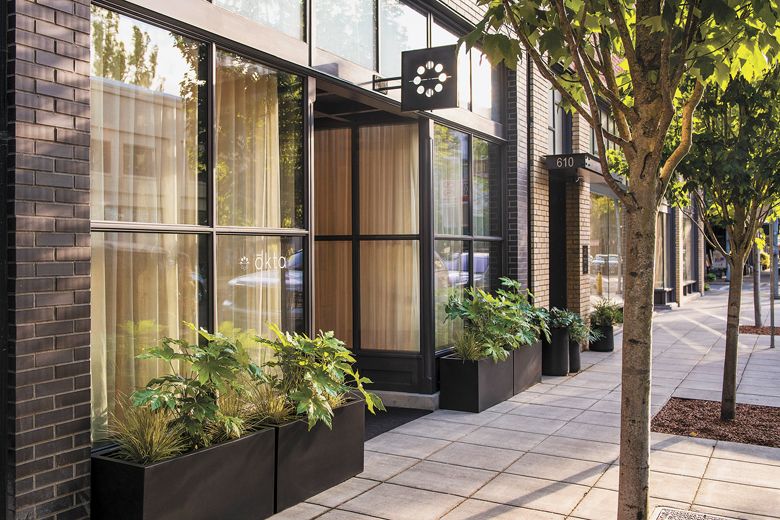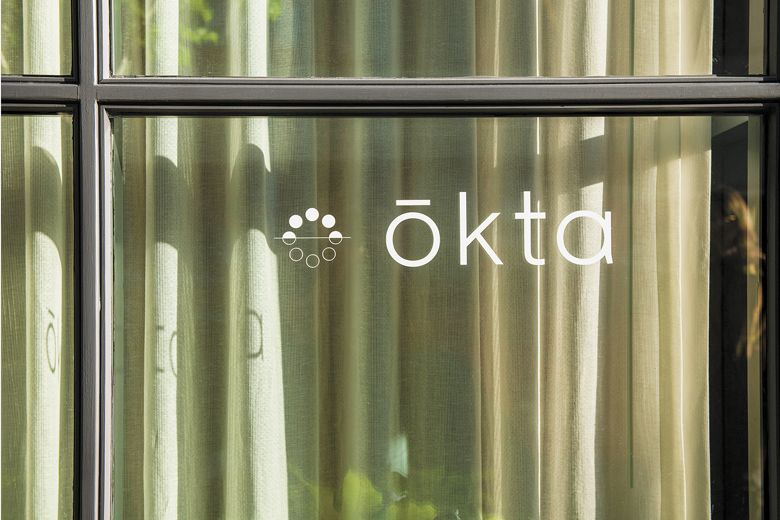Cloudy with a Chance of Stars
McMinnville’s new restaurant opens




By ANNELISE KELLY
Exclusive destination restaurant Õkta opened its McMinnville doors on July 13, along with partner enterprise Tributary Hotel.
Õkta is dedicated to celebrating food and wine sourced from the Willamette Valley. The restaurant, named after a unit to measure cloudiness, promises to re-invent the culinary landscape in the context of an immersive wine-country escape.
Perhaps the most ambitious wine country project since The Allison Inn & Spa opened in Newberg in 2009, Õkta and Tributary Hotel forge an integrated approach to hospitality. The luxury boutique eight-suite hotel and nine-table restaurant, conceived and designed in tandem, “tells the story of a sense of place that’s distinct here in the Valley,” says Christine Langelier, general manager. “Putting that on a plate and in the glass and really creating and curating a story. The Willamette Valley is so sought out for the vibrant culture of our wine growers, the agriculture, the natural beauty and, of course, the community we’re in.”
Nebraska native chef Matthew Lightner rules the kitchen. He put Portland restaurant, Castagna, on the map between 2009 to 2011 before his culinary career led him to Atera in New York City, earning two Michelin stars for the restaurant. Before returning to Oregon, Lightner enjoyed a stint at celebrated, avant-garde restaurant Mugaritz in Spain.
Farm-to-Table Ethos
Chef Lightner collaborates closely with Õkta’s own farmer, Katie Boeh, who cultivates an acre of garden on Ribbon Ridge near Carlton. The property is owned by Lightner’s partners, Katie Jackson and Shaun Kajiwara. Jackson’s family runs Jackson Family Wines in Sonoma County, California, and the couple fiercely support sustainability and regenerative agriculture.
Their farm-to-table culture runs deep. “We’re drawing inspiration from the Valley around us and truly honing in on the cadence of its micro seasons, depending on what’s being grown at our farm. We’re committed to regenerative agricultural practices and harvesting produce for the menu every single day,” says Langelier.
He has played a pivotal role in launching the farm and choosing what to plant, and he and Boeh “have a great farmer and chef relationship. They walk the property every morning to harvest whatever ingredients are going to be used on the menu that evening,” says Langelier.
Larder chef Larry Nguyen feels equally connected to the farm. “Nguyen is in charge of taking ingredients that are at their peak and applying different heritage preservation methods so we can use them in other seasons,” according to Langelier. Three greenhouses also expand the produce growing season.
Locally Driven Wine and Beverage Program
The restaurant’s extensive wine list similarly amplifies flavors of the area. “Our region is comparable to Burgundy with Pinot Noir and Chardonnay,” says wine and beverage director Ron Acierto. “However, there are so many new, unique aspects of winegrowing here, from the small mom-and-pop to what have become the big producers. We’re showcasing some amazing varietals beyond those commonly found in the Valley. There’s tremendous growth in Gamay Noir, Riesling and many other exciting varietals.”
While Acierto is committed to “honoring the local terroir and really focusing on the community as well,” he will showcase wines from around the world with an intense creativity that matches Lightner’s. Õkta also has a cellar bar driven by micro-seasonality featuring house-made syrups and mixers.
Creative Synergy
A formidable partnership is fueled by this collaboration of experts, with Lightner setting the pace. “Chef Matt Lightner really envisions all that we’re doing with such passion. Everyone is engaged and excited to implement his vision. We all want to be a part of it and continue to grow and excel– really honing our skills together,” says Langelier.
Acierto chimes in. “I’m constantly in awe of Lightner’s mind. We learn so much from him every day. His creativity is amazing. It’s that constant education, excitement and intrigue that he brings to all of us.”
Restaurant with Rooms
The Õkta-Tributary relationship inverts the traditional dynamic. Instead of the restaurant supporting the hotel, Tributary Hotel is intended to anchor and expand the experience of restaurant guests. Self-described as a “sanctuary of slow,” the hotel’s raison d’être is to expand the deep immersion of guests into a sense of place. Hotel guests savor an included multi-course breakfast served in-room, including small bites, pastries, local cheeses and meats, produce from the farm.
The intense partnership between restaurant and lodging echoes that of traditional Japanese ryokans, country inns that serve elevated cuisine. In England, the flourishing trend is described as “restaurants with rooms.” One domestic example is Michelin three-starred SingleThread Farm in Sonoma County.
“We want to create an experience that inspires our guests to not only stay but really connect with the community. Enjoy the labors of our local winemakers, producers and different purveyors that we come to know and love working with here in the Valley. Wine is not the Valley’s only export,” says Langelier.
“An abundance of produce, amazing cheese, duck farmers and grass-fed beef ranchers: there’s such an amazing collection of people doing really unique things here. We want to help steward that story.” That narrative is reinforced by tableware handcrafted by local ceramicists and even a large basalt boulder in the dining room, reminding diners of the Missoula Floods, which deposited the fertile soil that makes the Willamette Valley such a rich agricultural resource,” he continues.
Tributary Hotel is housed in the historic Taylor building, which has served the area as a farming supply shop, a hardware store and apartments. Says Langelier, “we’ve seen it go through different iterations, supporting the community and that’s something that we intend to do as well.” It’s an appropriate location for a project poised to take a place among the lineage of makers and artisans whose heritage runs deep in the Willamette Valley.










